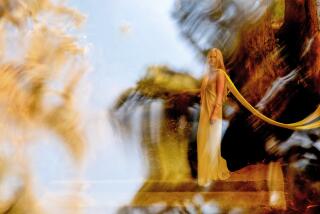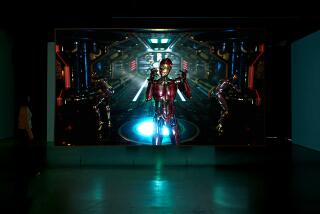Sidi Larbi Cherkaoui’s ‘Myth’
Like one of those dreams that are simultaneously frightening and alluring, Sidi Larbi Cherkaoui’s “Myth,” which received its U.S. premiere at UCLA’s Royce Hall on Friday night, trades in things that don’t quite add up, a strategy that proves -- perhaps intentionally -- as frustrating as it is exciting. Dreams are dense with meaning yet don’t make sense, after all, and as Cherkaoui proposes, neither do humankind’s cherished myths.
Myth, to paraphrase the philosopher Roland Barthes, is a conjuring trick. The stories we tell over and over generate continuity out of contingency and chaos. It is this need to shape the scattered shards of experience into the semblance of a harmonious whole that intrigues Cherkaoui and drives his dense, action-packed interdisciplinary work, produced in collaboration with the Antwerp, Belgium-based Toneelhuis theater collective.
Cherkaoui has rightly garnered a reputation as a rising star in the European pantheon; to his credit, he pursues myths of self and the world as they manifest through personal fears, moral aspirations, the thirst for knowledge, the assurances of history, ghost stories and popular culture.
And where better to locate the search for answers than in a library?
Here, amid an elaborate jungle gym of sliding bookcases, secret compartments and glowing panels, the Belgian Moroccan choreographer introduces a rogue’s gallery of strangers idly milling about with books in hand, knitting or rifling through the shelves, seemingly enjoying the respite of the peaceful surrounds.
After their calm is invaded by a chorus of black-clad figures who slink across the stage like wisps of smoke, then rise up to gaily wreak havoc, Darryl E. Woods begs the others to let him be the first in line when the large double doors dominating the back wall open. The effect of his plea is a transformation of the space from haven to antechamber to a great beyond, and what ensues becomes less explanatory than anticipatory.
This is not to diminish the strange magic that transpires. The hyper-animated shadow figures spiral and fall as if more spirit than matter, then gallop up the looming walls to watch over their more human counterparts, including Woods’ trash-talking, tap-dancing drag queen -- a stellar performance marred only by Cherkaoui’s descent into caricature by assigning self-hate to an otherwise complexly delivered character.
Conversing and singing in an international Babel (Latin, Spanish, Swedish, Flemish, Slovak, American and Australian English, Vietnamese, Italian, Thai, French, German and the dramatic intonations of Japanese anime), the able cast was aided by the discordant tonalities of vocalist Patrizia Bovi and Ensemble Micrologus’ medieval polyphony, performed live from a perch above the fray on the multistory set.
Language, though, eluded the poltergeist-like beings, who nevertheless spoke volumes through antics ranging from the humorous -- manually titillating the psychology-spouting Ulrika Kinn Sevensson before sucking her into a bookcase -- to the eerie and even violent, as when the acrobatic, animalistic trio of Damien Fournier, Damien Jalet and Satoshi Kudo demonstrated that their bite was worse than their bark.
Deftly buoyant in their physicality, the figures caromed around the stage in elastic movement sequences that mobilized bodies through a mélange of rolls, leaps, arches and horizontal perambulations.
At its best, “Myth” left undefined who these shadow people were -- whether they were the ghosts of past or future, present reflection or antitheses, and whether they were necessary to assisting the earthly denizens or holding them back.
As the multipart piece stretched over two hours, however, audiences could be forgiven for wanting to wake up from Cherkaoui’s incessant toying with the puzzle pieces he presented.
And when an answer arrived, literally, with the opening of the doors by a sweaty and fatigued Christ-like figure (Fournier), Cherkaoui undercut the delicious tension between good and evil, intellect and instinct, light and dark for which he had persuasively argued all night.
More to Read
The biggest entertainment stories
Get our big stories about Hollywood, film, television, music, arts, culture and more right in your inbox as soon as they publish.
You may occasionally receive promotional content from the Los Angeles Times.






